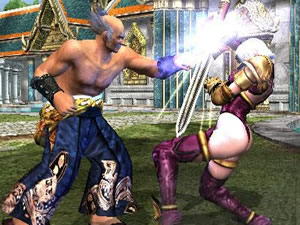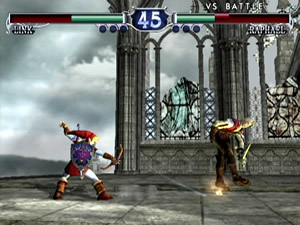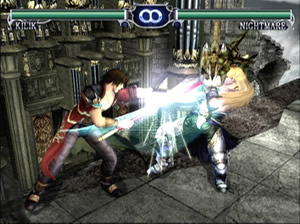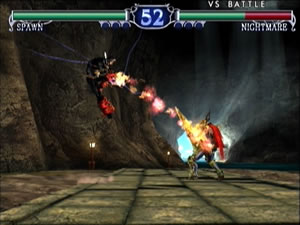A deeper shade of soul.
Contrary to popular opinion, hindsight isn’t always 20/20. We look back on our past mistakes constantly, but we don’t always see the proverbial light and sheepishly admit that we were wrong. Often we look back and totally agree with our mistakes. Sometimes it’s a little more like 20/80, maybe with a slight astigmatism.
When you review a video game, it’s pretty much impossible to take into account its long-term play value without consulting either a crystal ball or a wacko psychic, neither of which fits into our budget. Will a great game stand the test of time and get better with age, or will a better game come out and steal its crown? It’s a tough question that no sane reviewer on the planet would dare to answer.
Take
Namco’s Soul series. We gave both Soul Blade
and Soul Calibur an A-
as opposed to a solid A. Then days turned into weeks, weeks turned into months
and months turned into years, and somehow both games were nearly unrivaled.
Did we undergrade these masterpieces? We spent hours arguing over our grading
policy, eventually realizing that, at the time, they were graded correctly.
It wasn’t our fault no better fighters came out. We could sleep at night
again.
So when Soul Calibur II hit the GR doormat, we stared at
it with a palpable sense of dread. We knew it would be a great game, but would
we once again disappoint the Soul Blade/Soul Calibur hardcore
by not giving it the coveted GR A? Would we defy our competitors and not simply shower
it with unmitigated praise? And who would be the guy to take it in the balls
for the team?
The answers turned out to be: Yes. Yes. Me.
For the record, Soul Calibur II for the PS2, Gamecube and
Xbox is a fantastic game, just about the best fighting game available (with
VF 4 Evolution running neck and
neck). Its outstanding delivery is only equaled by its fun, engaging gameplay; but we said as much about the two previous games. The fact of the matter
is that while Soul Calibur II is a top-notch product, it is
not entirely what we hoped it would be’but it sure is something to see.
The game follows very closely in the footsteps of its forbears. Once again, a gang of warriors are on a quest for the evil Soul Edge sword, which was defeated by the powerful Soul Calibur sword, and once again most of the plot makes little to no sense. But that ain’t why you’re here.
You’re here for the gameplay, and Soul Calibur II serves
it up in spades. You have high and low attacks, one kick and a guard, but combinations
and directional pad moves lead to countless moves. Unlike many fighting games,
a novice can pick it up and do well without really knowing the lengthy command
lists by heart, though if you take the time to learn the craft, you can turn
it into something of an art form.
The most significant additions to this year’s version are the new characters.
Most of the fighters from Soul Calibur make a return in some
form or another, so Mitsurugi maniacs (like yours truly) will find it a comfortable
fit from the outset. The fencer Raphael is an intriguing new character, complete
with lighting fast strikes and a smooth, flowing style. Talim is another Taki-type,
a two-bladed speed demon. Yunsung is essentially an upgraded version of the
missing Hwang, Tekken alum Yoshimitsu gets the SC
treatment, and Cassandra plays like Sophitia’s little sister. Tack on three
unlockable characters (who were non-playable in the Japanese version of the
game) and you have a pretty sweet lineup. Plus there’s Necrid, Todd McFarlane’s
offering, who has some cool moves but doesn’t really fit in stylistically with
the others.
 Speaking
Speaking
of which, the biggest difference between the three home versions of Soul
Calibur II is that each comes with an additional character unique to
that console. The Gamecube is arguably the winner here thanks to the inclusion
of Zelda’s geeky
elf, Link, who comes equipped with all the bombs and arrows you’d want. Xbox
owners get another McFarlane creation in Spawn, who’s a pretty solid character
and even has limited flying abilities. The PS2 gets the shaft in Heihachi from
Tekken, who has some good melee moves but just isn’t nearly
as cool as the other two.
So who’s the best? I wouldn’t offer an objective answer to that with a ten-foot
pole, but I personally lean towards Link since at least he’s a classic video
game character and there’s a certain joy in finally getting to kick some major
ass with him.
And major ass you will most certainly kick in any of Soul Calibur
II‘s various modes. They’re all pretty much mainstays: Arcade, Time
Attack, Survival, Team Battle, Vs., Vs. Team Battle, and Practice. This last
one is decent but not as effective as the great one found in VF 4 Evolution;
perhaps a training mode that taught how to string together attacks for juggling
or whatnot would have been better.
The main single-player mode is Weapon Master, which hearkens back to the Edge
Master mode of Soul Blade. Here you fight your way across a
giant map under a variety of circumstances. One mission might require you to
smack an enemy only while he’s airborne; another might feature enemies who heal
or a ground littered with mines ” if you fall down, you die. You can switch
characters at any time, so if you can’t seem to beat one mission with creepy
Voldo, you can give it a go with the nimble Taki.
Along the way, you earn gold and experience points. The gold is used to buy
new costumes, art and weapons, which then become available in other play modes.
The weapons are supposed to imbue different attack, defense or range bonuses,
but it’s mainly just window dressing. Gaining experience points increases your
level, which doesn’t really mean anything aside from opening up the hard-to-reach
hidden characters.
While Weapon Master mode is a step up (or rather, back) from Soul
Calibur‘s Edge Master Mode, it can get repetitive and at times really
difficult. Get used to hacking away at certain missions over and over again,
particularly when you’ve beaten it at least once.
But when you grow weary, just call a buddy and whack away at the multiplayer.
The computer AI is no slouch (though not as good as what you’ll find in VF
4: Evo), but the real life of any fighter is found
with friends, and Soul Calibur II doesn’t disappoint. A case
of beer and some 8-character VS. Team Battle makes for an excellent geek night.
Soul Calibur‘s graphics were a huge improvement over Soul
Blade‘s (due in many ways to the power of the Dreamcast), and while
Soul Calibur II isn’t such a large a step, it still looks amazing.
Great lighting and character modeling rule the day, and if there is a better
example of motion-capture, I’d like to see it. Watching some of the characters
in their Exhibition Theater performances is like watching real life katas,
particularly the demos for Raphael, Yunsung and Kilik.
 Each
Each
console system is rock solid in performance, though the Xbox features slightly
smoother lines and a slightly steadier framerate. The PS2 is probably the worst
of the lot, but it still looks terrific. You aren’t going to be disappointed
any way you go.
However, this doesn’t extend to character endings, which, like Soul
Calibur, is still cheesy text set against static pictures. The original
Soul Blade had those cool in-engine cut-scenes. Why the change?
The sound, at least, remains great with a big, sweeping soundtrack and terrific sound effects. You can choose Japanese or English voiceovers, and I heartily recommend the original Japanese unless you’re in a B-movie mood.
So for all intents and purposes, Soul Calibur II is a great
game. It’s got all the goods you’d expect, from solid gameplay to smooth presentation.
But where the game comes up short is giving you things you don’t expect,
and considering that the series is in many ways unchanged since it first hit
the PSX back in 1997, that’s a shame.
Take the level design. The arenas look okay, but after the multi-tiered levels
in DOA or even just the
neat snow effect in VF 4, they feel a little stifled and dated.
In the Weapon Master mode, you occasionally have to battle through “dungeons.’
I was all excited at first, thinking this would be some weird new form of Tekken‘s
Force mode or maybe even a bit like the underrated Bushido
Blade, but no such luck. Rather, they’re just a bunch of matches strung
together against a smaller version of the big world map
And while the gameplay puts a little more emphasis on Guard Blocks than in
the past, it still feels almost exactly like Soul Calibur.
Upon turning it on for the very first time, I promptly beat Arcade mode in 7
minutes using my trusty Mitsurugui. In fact, some of the character demos and
move lists are nearly identical to Soul Calibur‘s. Even two
of the three unlockable bonus characters are just new skins on old move sets;
Berserker is astonishingly reminiscent of Soul Blade‘s Rock,
while Assassin is mostly Hwang in ninja gear. That’s how little things have
changed. Depending upon how you think about it, that can be either a good thing
or a not-so-good thing. I think it’s a little of both.
Soul Calibur II is a finely honed blade indeed, but it’s
not a particularly new one. Is that too harsh? I’ll let you know in a few years
when I fondly look back at this review and notice a small spot on my glasses.
In the meantime, do both of us a favor and go buy it. Hindsight might not be
20/20, but your immediate future should be crystal clear.

-
That delicious
-
Smart combat system
-
Looks and sounds great on all platforms
-
Some good new characters
-
Some weak new characters
-
No decent ending videos
-
Relatively unchanged in 6 years











